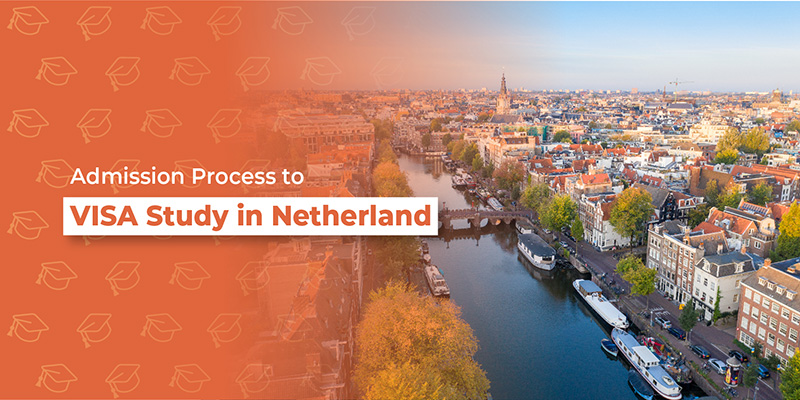Updated date: 9th January 2023
Netherlands is known as one of the hubs for quality education in Europe. This is also accentuated by the fact that Netherlands is famous for its research institutions just as much as it is for undergraduate institutions. For those who are willing to study in Netherlands, mentioned hereunder are some of the details about the admission cycle.
From beginning to end, the whole process can be divided into three parts. The first one is to choose a course and University to study in Netherlands, the second is to apply and get the admission, and the last step would be applying for the visa and getting one.
1. Universities in Netherlands:
The Universities in Netherlands, as we have mentioned are among the best in the world. In fact, 13 of them feature in the top universities of the world. There are plenty of courses to choose from and plenty of universities offering them. Here are the top Dutch Universities for International Students to choose from:
- University of Amsterdam
- Delft University of Technology
- Utrecht University
- Wageningen University & Research
- Leiden University
- Eindhoven University of Technology
- University of Groningen
- Erasmus University Rotterdam
- University of Twente
- Vrije Universiteit Amsterdam
These are just 10 of the most highly-rated universities in Netherlands. You can find the list of all universities in Netherlands here: Universities in Netherlands for International Students

2. When to Apply
You have two options when you study in Netherlands for your choice of semesters-
However, unlike for other European countries, there really are no fixed timetables for the deadlines when you can apply to the universities. It really depends on whether you’re applying for a research university, an undergraduate program, or a master’s program.
For example, undergraduate requires you to apply through a centralized portal for all the universities. This has a wider acceptance than the website in Germany. For Master’s and Research programs, you are required to apply to each of the universities alone.
While there really is no average, strict or iron-clad fact about deadlines in Netherlands, it must be remembered that universities, individually, have it fixed. Therefore, hereunder mentioned are the earliest and the latest deadlines for the programmes for your study abroad in Netherlands
Dutch Universities Application Deadlines
|
Name of the Program
|
February Semester
|
September Semester
|
|
Earliest Deadline
|
Latest Deadline
|
Earliest Deadline
|
Latest Deadline
|
|
Bachelor’s
|
1st December
|
1st January
|
1st May
|
1st August
|
|
Master’s
|
1st September
|
15th December
|
1st March
|
15th May
|
|
Research
|
1st November
|
1st December
|
1st April
|
15th June
|
|
Technical Universities
|
15th November
|
30th January
|
1st May
|
1st August
|
Therefore when you are considering applications, ensure that you keep these thoughts in your head
3. Application Process:
Once you have chosen the right course and university to apply to, you need to apply at a university online. The Numerus Fixus is a degree course application system managed by the Dutch government for higher education. However, most of the courses under this system are in the Dutch language.
International students can also apply directly to university websites. Studylink is also a portal where students can apply to multiple universities. If they have been rejected by one university, they can apply for another one.
You can find the step-by-step process to apply to a university in Netherlands: How to Apply at Universities in Netherlands
4. Study Abroad in Netherlands Requirements:
Documents:
One of the most important requirements is the supporting documents one has to prepare before beginning the application process. Here are some of the general requirements to study in Netherlands:
- A valid passport
- Passport photographs
- Statement of Purpose in English
- Diplomas and Certificates of previous education
- Transcripts and Marksheets
- CV/Resume
- Language Proficiency Proof (English or Dutch depending on the course language)
- Payment Receipt of the Application fees
Accommodations:
Unlike in other places, studying in Netherlands is different. Students don’t really stay in college accommodations. They tend to stay in accommodations outside the college. This can be done in two ways-
- If the students themselves have contacts, they can arrange for the accommodation, otherwise
- They can ask the university for accommodation.
It must be remembered that Netherlands, being an educational hub, has a lot of demand for accommodation. Therefore, when you are applying for accommodation there, you must do so well in advance to the deadline.
It is advisable to start applying about 2 months before the deadline to ensure that you stand a chance to gain university-sponsored housing cooperative accommodation. It is in these accommodations that one can find students from same universities, or make friends.
Finances For Visa:
Study in Netherlands isn’t as cheap as studying in Germany or France is. Therefore, one needs to get their finances in order before they start applying to universities. The Netherlands also asks for proof of finances.
Refer to this article to know what you can expect during your study in Netherlands and this article for understanding what courses to study. That will give you a rough idea of how much your expenses would be. Rent will always be your main expense.
Visa also takes time, therefore it is advised to apply for visa about 3-4 months before the start of the term to avoid any last minute hassles. You need insurance well, so ensure you arrange for that. The major documents that are required for your visa apart from the obvious are proof of funds and insurance.
5. Visa Application and Processing
As we have mentioned, visa processing takes time, and therefore it is important to get it done as soon as possible. The university one has been accepted into, applies for the student visa in Netherlands on their behalf. Students are then required to submit the documents for the visa, give biometrics (photos and fingerprints), and appear for a visa interview at the nearest embassy or consulate of Netherlands.
You can find detailed information on Netherlands Visa, Study Permit, and Step by Step Process here: How to Get a Student Visa for Netherlands
stay tuned at www.jeduka.com for the latest updates and useful information for all countries.
Read Also:-
What to Expect When You Study in Netherlands
Checklist before study in Netherlands
Warning: This Article Will Make You Want to Study in The Netherlands






 Study in Netherlands
Study in Netherlands
Categories: Study Abroad